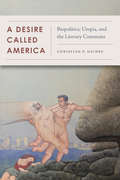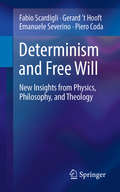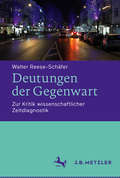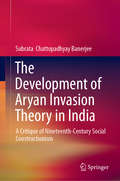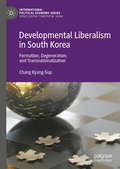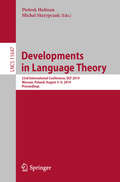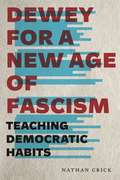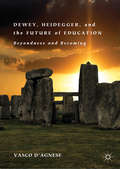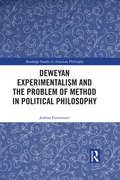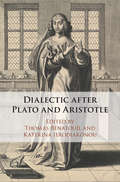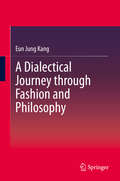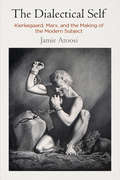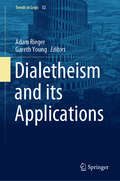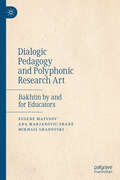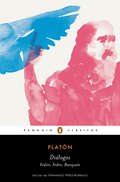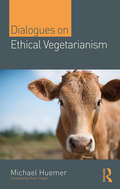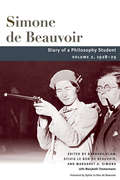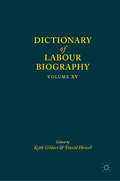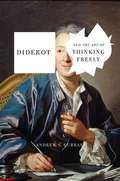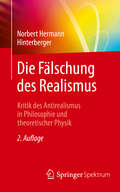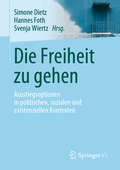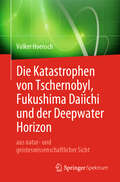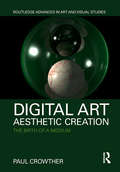- Table View
- List View
A Desire Called America: Biopolitics, Utopia, and the Literary Commons
by Christian HainesCritics of American exceptionalism usually view it as a destructive force eroding the radical energies of social movements and aesthetic practices. In A Desire Called America, Christian P. Haines confronts a troubling paradox: Some of the most provocative political projects in the United States are remarkably invested in American exceptionalism. Riding a strange current of U.S. literature that draws on American exceptionalism only to overturn it in the name of utopian desire, Haines reveals a tradition of viewing the United States as a unique and exemplary political model while rejecting exceptionalism’s commitments to nationalism, capitalism, and individualism. Through Walt Whitman, Emily Dickinson, William S. Burroughs, and Thomas Pynchon, Haines brings to light a radically different version of the American dream—one in which political subjects value an organization of social life that includes democratic self-governance, egalitarian cooperation, and communal property.A Desire Called America brings utopian studies and the critical discourse of biopolitics to bear upon each other, suggesting that utopia might be less another place than our best hope for confronting authoritarianism, neoliberalism, and a resurgent exclusionary nationalism.
Determinism and Free Will: New Insights From Physics, Philosophy, And Theology
by Fabio Scardigli Gerard ’t Hooft Emanuele Severino Piero CodaIn this small book, theoretical physicist Gerard 't Hooft (Nobel prize 1999), philosopher Emanuele Severino (Lincei Academician), and theologian Piero Coda (Pontifical Lateran University) confront one another on a topic that lies at the roots of quantum mechanics and at the origin of Western thought: Determinism and Free Will. "God does not play dice" said Einstein, a tenacious determinist. <P><P>Quantum Mechanics and its clash with General Relativity have reanimated ancient dilemmas about chance and necessity: Is Nature deterministic? Is Man free? The “free-will theorem” by Conway and Kochen, and the deterministic interpretation of quantum mechanics proposed by 't Hooft, revive such philosophical questions in modern Physics. Is Becoming real? Is the Elementary Event a product of the Case? <P><P>The cyclopean clash between Heraclitus and Parmenides has entered a new episode, as evidenced by the essays in this volume.
Deutungen der Gegenwart: Zur Kritik wissenschaftlicher Zeitdiagnostik
by Walter Reese-SchäferDieser Band betrachtet Zeitdiagnose als eine notwendige wissenschaftliche Aufgabe und als eine entscheidende Möglichkeit, gegenwartsrelevante Forschung voranzutreiben und interdisziplinäre Perspektiven zu entwickeln. Der erste Teil des Buches stellt eine Theorie der Zeitdiagnostik vor. Im zweiten Teil wird der immer zu vollziehende Sprung von der Urteilskraft zur Entscheidung betrachtet, während es im dritten und vierten Teil um zentrale zeitdiagnostische Leitbegriffe geht. Insgesamt entwirft der Band das Bild einer wissenschaftlich reflektierten Zeitdiagnostik, die man als kritische Wirklichkeitswissenschaft verstehen kann.
The Development of Aryan Invasion Theory in India: A Critique of Nineteenth-Century Social Constructionism
by Subrata Chattopadhyay BanerjeeThis book delves deep into the Social Construction of Theory, comparative epistemology and intellectual history to stress the interrelationship between diverse cultures during the colonial period and bring forth convincing evidence of how the 19th century was shaped. It approaches an interesting relation between the linguistic studies of 19th century’s scientific world and subsequent widespread acceptance of the empirically weak theory of the Aryan invasion. To show entangled history in a globalized world, the book draws on the Aryan Invasion Theory to highlight how different socio-religious parties commonly shape a new theory. It also explores how research is affected by the so-called social construction of theory and comparative epistemology, and deals with scholarly advancement and its relation with contemporary socio-political demands. The most significant conclusion of the book is that academic studies are prone to comparative epistemology, even under the strict scrutiny of the so-called scientific methods.
Developmental Liberalism in South Korea: Formation, Degeneration, and Transnationalization (International Political Economy Series)
by Chang Kyung-SupThis book characterizes South Korea’s pre-neoliberal regime of social governance as developmental liberalism and analyzes the turbulent processes and complex outcomes of its neoliberal degeneration since the mid-1990s. Instead of repeating the politically charged critical view on South Korea’s failure in socially inclusionary and sustainable development, the author closely examines the systemic interfaces of the economic, political, and social constituents of its developmental transformation. South Korea has turned and remained developmentally liberal, rather than liberally liberal (like the United States), in its economic and sociopolitical configuration of social security, labor protection, population, education, and so forth. Initially conceived in the late 1980s, ironically along its democratic restoration, and radically accelerated during the national financial crisis in the late 1990s, South Korea’s neoliberal transition has become incomparably volatile and destructive, due crucially to its various distortive effects on the country’s developmental liberal order.
Developments in Language Theory: 23rd International Conference, DLT 2019, Warsaw, Poland, August 5–9, 2019, Proceedings (Lecture Notes in Computer Science #11647)
by Piotrek Hofman Michał SkrzypczakThis book constitutes the proceedings of the 23rd International Conference on Developments in Language Theory, DLT 2019, held in Warsaw, Poland, in August 2019. The 20 full papers presented together with three invited talks were carefully reviewed and selected from 30 submissions. The papers cover the following topics and areas: combinatorial and algebraic properties of words and languages; grammars, acceptors and transducers for strings, trees, graphics, arrays; algebraic theories for automata and languages; codes; efficient text algorithms; symbolic dynamics; decision problems; relationships to complexity theory and logic; picture description and analysis, polyominoes and bidimensional patterns; cryptography; concurrency; celluar automata; bio-inspired computing; quantum computing.
Dewey for a New Age of Fascism: Teaching Democratic Habits (Rhetoric and Democratic Deliberation #22)
by Nathan CrickDuring the rise of fascism in the early twentieth century, American philosopher and educational reformer John Dewey argued that the greatest threat to democracy was not a political regime or even an aggressive foreign power but rather a set of dispositions or attitudes. Though not fascist in and of themselves, these habits of thought—rugged individualism and ideological nationalism—lay the foundation for fascism. In this study, Nathan Crick uses Dewey’s social thought and philosophy of education to provide insight into and resources for transforming our present-day politics.Through a close reading of Dewey’s political writings and educational theory, Crick elaborates Dewey’s vision of democratic social life and the education required for its foundation. He shows that for Dewey, communication is essential to cultivating sympathy, intelligence, and creativity—habits of thought that form the core of democratic culture. Crick then lays out a broad curriculum of logic, aesthetics, and rhetoric for inculcating these habits in the classroom, arguing that if we are to meet the challenge of fascism, we must teach these new arts as if our civilization depends on it—because in our new age of politics, it does.Comprehensive and pragmatic, this book presents an experimental model of education that can be applied across the humanities curriculum. It will be of interest to teachers of writing, composition, and rhetoric as well as scholars and students of communication studies, pedagogy, and political theory.
Dewey for a New Age of Fascism: Teaching Democratic Habits (Rhetoric and Democratic Deliberation)
by Nathan CrickDuring the rise of fascism in the early twentieth century, American philosopher and educational reformer John Dewey argued that the greatest threat to democracy was not a political regime or even an aggressive foreign power but rather a set of dispositions or attitudes. Though not fascist in and of themselves, these habits of thought—rugged individualism and ideological nationalism—lay the foundation for fascism. In this study, Nathan Crick uses Dewey’s social thought and philosophy of education to provide insight into and resources for transforming our present-day politics.Through a close reading of Dewey’s political writings and educational theory, Crick elaborates Dewey’s vision of democratic social life and the education required for its foundation. He shows that for Dewey, communication is essential to cultivating sympathy, intelligence, and creativity—habits of thought that form the core of democratic culture. Crick then lays out a broad curriculum of logic, aesthetics, and rhetoric for inculcating these habits in the classroom, arguing that if we are to meet the challenge of fascism, we must teach these new arts as if our civilization depends on it—because in our new age of politics, it does.Comprehensive and pragmatic, this book presents an experimental model of education that can be applied across the humanities curriculum. It will be of interest to teachers of writing, composition, and rhetoric as well as scholars and students of communication studies, pedagogy, and political theory.
Dewey, Heidegger, and the Future of Education: Beyondness and Becoming
by Vasco d'AgneseDrawing on insights into the philosophies of Dewey and Heidegger, this book moves forward the greater philosophical discourse surrounding education. It illuminates deep affinities between the corresponding traditions of Dewey and Heidegger, broadly labeled hermeneutics and pragmatism, and in doing so reveals the potential of the Dewey-Heidegger comparison for the future of education. To accomplish this task, Vasco d’Agnese explores the Deweyan and Heideggerian understanding of existence and experience. Both thinkers believed that humans are vulnerable from the very beginning, delivered to an uncanny and uncertain condition. On the other hand, such an uncanniness and dependency, rather than flowing in nihilistic defeat of educational purposes, puts radical responsibility on the side of the subject. It is, then, educationally promising. The book explains that for both Dewey and Heidegger, being a subject means being-with-others while transcending and advancing one’s boundaries, thus challenging the managerial framework of education that currently dominates educational institutions throughout the world.
Deweyan Experimentalism and the Problem of Method in Political Philosophy (Routledge Studies in American Philosophy)
by Joshua ForstenzerThis book proposes a pragmatist methodological framework for generating practically relevant political philosophy. It draws on John Dewey’s social and political philosophy to develop an "experimentalist" method, thus charting a middle course between idealism and realism in political philosophy. Deweyan experimentalism promises to balance civic deliberation, empirical facts, and moral considerations by reconstructing Dewey’s pragmatist conceptions of ‘philosophy’ and ‘democracy’ from the perspective of social action. While some authors have taken the steps to articulate Dewey’s experimentalism, they have focused on institutional rather than methodological implications. This book is original in the ways in which it situates the role of ideas in political practice and contemporary political problems. Additionally, it underlines the similarities between today and the historical context in which Dewey wrote, connects Dewey’s social and political philosophy to Greek and Roman mythology, and concludes with a timely case study in which the author’s methodological insights are applied. The result is a book that offers a focused reconstruction of Dewey’s work and shows its relevance for engaging with contemporary issues in political philosophy and political theory.
Dialectic after Plato and Aristotle
by Thomas Bénatouïl Katerina IerodiakonouAncient dialectic started as an art of refutation and evolved into a science akin to our logic, grammar and linguistics. Scholars of ancient philosophy have traditionally focused on Plato's and Aristotle's dialectic without paying much attention to the diverse conceptions and uses of dialectic presented by philosophers after the classical period. To bridge this gap, this volume aims at a comprehensive understanding of the competing Hellenistic and Imperial definitions of dialectic and their connections with those of the classical period. It starts from the Megaric school of the fourth century BCE and the early Peripatetics, via Epicurus, the Stoics, the Academic sceptics and Cicero, to Sextus Empiricus and Galen in the second century CE. The philosophical foundations and various uses of dialectic are closely analysed and systematically examined together with the numerous objections that were raised against them.
A Dialectical Journey through Fashion and Philosophy
by Eun Jung KangThis book takes an in-depth look at the integration of fashion and philosophy. It challenges the deeply rooted prejudice or misconception that fashion is a field limited to body-oriented and appearance-related themes and practices. It also reveals that fashion is intermeshed with distinctively modern issues that belong to the realm of the mind as well as the body. In doing so, it refashions philosophy and philosophizes fashion, which ultimately amount to the same thing. The book argues that while the philosophization of fashion can give a clearer understanding of some esoteric areas of philosophy and fashion’s close connection to modern societies and politics, it also shows that philosophy can assist in redeeming fashion from the objective, bodily world, positioning it as an indispensable part of the humanities. This is because fashion manifests critical aspects of human culture in our time, and is an expression of the zeitgeist, which is interwoven with the unfolding of history. This book will be highly relevant to students and researchers in fashion studies who are looking for the theoretical underpinnings and insights for their own work. It will also be of keen interest to scholars in the field of philosophy who are seeking to apply philosophical concepts to both everyday life and our empirical world.
The Dialectical Self: Kierkegaard, Marx, and the Making of the Modern Subject
by Jamie AroosiAlthough Karl Marx and Søren Kierkegaard are both major figures in nineteenth-century Western thought, they are rarely considered in the same conversation. Marx is the great radical economic theorist, the prophet of communist revolution who famously claimed religion was the "opiate of the masses." Kierkegaard is the renowned defender of Christian piety, a forerunner of existentialism, and a critic of mass politics who challenged us to become "the single individual." But by drawing out important themes bequeathed them by their shared predecessor G. W. F. Hegel, Jamie Aroosi shows how they were engaged in parallel projects of making sense of the modern, "dialectical" self, as it realizes itself through a process of social, economic, political, and religious emancipation.In The Dialectical Self, Aroosi illustrates that what is traditionally viewed as opposition is actually a complementary one-sidedness, born of the fact that Marx and Kierkegaard differently imagined the impediments to the self's appropriation of freedom. Specifically, Kierkegaard's concern with the psychological and spiritual nature of the self reflected his belief that the primary impediments to freedom reside in subjectivity, such as in our willing conformity to social norms. Conversely, Marx's concern with the sociopolitical nature of the self reflected his belief that the primary impediments to freedom reside in the objective world, such as in the exploitation of the economic system. However, according to Aroosi, each thinker represents one half of a larger picture of freedom and selfhood, because the subjective and objective impediments to freedom serve to reinforce one another.By synthesizing the writing of these two diametrically opposed figures, Aroosi demonstrates the importance of envisioning emancipation as a subjective, psychological, and spiritual process as well as an objective, sociopolitical, and economic one. The Dialectical Self attests to the importance and continued relevance of Marx and Kierkegaard for the modern imagination.
Dialetheism and its Applications (Trends in Logic #52)
by Adam Rieger Gareth YoungThe purpose of this book is to present unpublished papers at the cutting edge of research on dialetheism and to reflect recent work on the applications of the theory. It includes contributions from some of the most respected scholars in the field, as well as from young, up-and-coming philosophers working on dialetheism.Moving from the fringes of philosophy to become a main player in debates concerning truth and the logical paradoxes, dialetheism has thrived since the publication of Graham Priest’s In Contradiction, and several of the papers find their roots in a conference on dialetheism held in Glasgow to mark the 25th anniversary of Priest’s book. The content presented here demonstrates the considerable body of work produced in this field in recent years.With a broad focus, this book also addresses the applications of dialetheism outside the more familiar area of the logical paradoxes, and includes pieces discussing the application of dialetheism in metaphysics, philosophy of language, and philosophy of mind.
Dialogic Pedagogy and Polyphonic Research Art: Bakhtin by and for Educators
by Eugene Matusov Ana Marjanovic-Shane Mikhail GradovskiThis book presents voices of educators describing their pedagogical practices inspired by the ethical ontological dialogism of Mikhail M. Bakhtin. It is a book of educational practitioners, by educational practitioners, and primarily for educational practitioners. The authors provide a dialogic analysis of teaching events in Bakhtin-inspired classrooms and emerging issues, including: prevailing educational relationships of power, desires to create a so-called educational vortex in which all students can experience ontological engagement, and struggles of innovative pedagogy in conventional educational institutions. Matusov, Marjanovic-Shane, and Gradovski define a dialogic research art, in which the original pedagogical dialogues are approached through continuing dialogues about the original issues, and where the researchers enter into them with their mind and heart.
Dialogic Pedagogy and Polyphonic Research Art: Bakhtin by and for Educators
by Eugene Matusov Ana Marjanovic-Shane Mikhail GradovskiThis book presents voices of educators describing their pedagogical practices inspired by the ethical ontological dialogism of Mikhail M. Bakhtin. It is a book of educational practitioners, by educational practitioners, and primarily for educational practitioners. The authors provide a dialogic analysis of teaching events in Bakhtin-inspired classrooms and emerging issues, including: prevailing educational relationships of power, desires to create a so-called educational vortex in which all students can experience ontological engagement, and struggles of innovative pedagogy in conventional educational institutions. Matusov, Marjanovic-Shane, and Gradovski define a dialogic research art, in which the original pedagogical dialogues are approached through continuing dialogues about the original issues, and where the researchers enter into them with their mind and heart.
Diálogos: Fedón, Fedro, Banquete
by PlatónUna de las obras cumbre de la filosofía y la cultura occidental. «Se apoderó de mí el temor de quedarme completamente ciego de alma si miraba a las cosas con los ojos.» El presente volumen reúne tres diálogos fundamentales de Platón; tres de sus obras más leídas y comentadas, junto a La república . En Fedón, que tiene lugar durante las últimas horas de vida de Sócrates, Platón expone sus ideas en relación a la madurez y reflexiona sobre la inmortalidad del alma. Fedro, reconocido como uno de los diálogos platónicos más bellos, gira en torno al tema del amor. Este también se convierte en objeto de reflexión en Banquete, considerada una de las obras cumbres escritas sobre esta cuestión y en la que el diálogo se desarrolla a lo largo de una reunión de amigos e intelectuales. Este magnífico volumen presenta la traducción clásica de Luis Gil y María Arujo. Asimismo la edición está a cargo de Fernando Pérez-Borbujo, filósofo y profesor titular en la facultad de humanidades de la Universidad Pompeu Fabra de Barcelona.
Dialogues on Ethical Vegetarianism
by Michael HuemerAfter lives filled with deep suffering, 74 billion animals are slaughtered worldwide every year on factory farms. Is it wrong to buy the products of this industry? In this book, two college students – a meat-eater and an ethical vegetarian – discuss this question in a series of dialogues conducted over four days. The issues they cover include: how intelligence affects the badness of pain, whether consumers are responsible for the practices of an industry, how individual choices affect an industry, whether farm animals are better off living on factory farms than not existing at all, whether meat-eating is natural, whether morality protects those who cannot understand morality, whether morality protects those who are not members of society, whether humans alone possess souls, whether different creatures have different degrees of consciousness, why extreme animal welfare positions "sound crazy," and the role of empathy in moral judgment. The two students go on to discuss the vegan life, why people who accept the arguments in favor of veganism often fail to change their behavior, and how vegans should interact with non-vegans. A foreword, by Peter Singer, introduces and provides context for the dialogues, and a final annotated bibliography offers a list of sources related to the discussion. It offers abstracts of the most important books and articles related to the ethics of vegetarianism and veganism. Key Features: Thoroughly reviews the common arguments on both sides of the debate. Dialogue format provides the most engaging way of introducing the issues. Written in clear, conversational prose for a popular audience. Offers new insights into the psychology of our dietary choices and our responsibility for influencing others.
Diary of a Philosophy Student: Volume 2, 1928-29 (Beauvoir Series)
by Simone Beauvoir"That’s when everything started," Simone de Beauvoir wrote in an entry dated July 8, 1929. On that day, her relationship with Jean-Paul Sartre began. This second volume of Beauvoir's Diary of a Philosophy Student takes readers into smoky dorm rooms and inter-war Paris as it continues the feminist philosopher's coming-of-age story. Here are Beauvoir's famous sparring sessions with Sartre in the Luxembourg Gardens--teasing him while stoking her burgeoning intellectual strength. Here also are her friendships and academic challenges, the discovery of important future influences like Barrès and Hegel, and her early forays into formulating the problem of the Other. In addition to the diary, the editors provide invaluable supplementary material. A trove of footnotes and endnotes elaborates on virtually every reference made by Beauvoir, offering an atlas of her knowledge and education while at the same time allowing readers to share her intellectual and cultural milieu. Translator and scholar Barbara Klaw also contributes an introduction on reading Beauvoir's diaries as a philosophy of self-help.
Dictionary of Labour Biography: Volume XV
by David Howell Keith GildartThe Dictionary of Labour Biography has an outstanding reputation as a reference work for the study of nineteenth and twentieth century British history. Volume XV maintains this standard of original and thorough scholarship. Each entry is written by a specialist drawing on an array of primary and secondary sources. The biographical essays engage with recent historiographical developments in the field of labour history. The scope of the volume emphasises the ethnic and national diversity of the British labour movement and neglected political traditions.
Diderot and the Art of Thinking Freely
by Andrew S. CurranA spirited biography of the prophetic and sympathetic philosopher who helped build the foundations of the modern world. <P><P>Denis Diderot is often associated with the decades-long battle to bring the world's first comprehensive Encyclopédie into existence. But his most daring writing took place in the shadows. <P><P>Thrown into prison for his atheism in 1749, Diderot decided to reserve his best books for posterity--for us, in fact. <P><P>In the astonishing cache of unpublished writings left behind after his death, Diderot challenged virtually all of his century's accepted truths, from the sanctity of monarchy, to the racial justification of the slave trade, to the norms of human sexuality. <P><P>One of Diderot's most attentive readers during his lifetime was Catherine the Great, who not only supported him financially, but invited him to St. Petersburg to talk about the possibility of democratizing the Russian empire. <P><P>In this thematically organized biography, Andrew S. Curran vividly describes Diderot's tormented relationship with Rousseau, his curious correspondence with Voltaire, his passionate affairs, and his often iconoclastic stands on art, theater, morality, politics, and religion. <P><P>But what this book brings out most brilliantly is how the writer's personal turmoil was an essential part of his genius and his ability to flout taboos, dogma, and convention.
Die Fälschung des Realismus: Kritik des Antirealismus in Philosophie und theoretischer Physik
by Norbert Hermann HinterbergerDas Werk setzt sich kritisch mit dem Antirealismus in Philosophie und theoretischer Physik auseinander und plädiert für einen kritischen Realismus. Es werden antirealistische (konventionalistische, instrumentalistische, operationalistische, strukturalistische bzw. mathematisch platonistische) Positionen in der Philosophie (der Physik) kritisiert. Der Autor konfrontiert diese mit dem konsequent fallibilistischen Falsifikationismus des kritischen Realismus/Rationalismus und bildet das Ganze auf aktuelle Probleme der physikalischen Kosmologie ab. Dazu werden die Falsifizierbarkeit der Loop Quantum Cosmology (einer stark vereinfachten Form der Loop Quantum Gravity) sowie fehlende Testmöglichkeiten in der String- bzw. M-Theorie besprochen, aber z.B. auch Kontinuitäts-Ideen des String-Theoretikers David Tong sowie Martin Bojowalds Vereinigungs-Visionen bezüglich String- und Loop- Ansatz. Die zweite Auflage ist vollständig durchgesehen und um ein umfangreiches neuntes Kapitel ergänzt. Hier wird insbesondere Lee Smolins Idee einer globalen Zeit relational zu den Energie-Kausalitäten unseres Universums diskutiert.
Die Freiheit zu gehen: Ausstiegsoptionen in politischen, sozialen und existenziellen Kontexten
by Simone Dietz Hannes Foth Svenja WiertzGehen zu können, wenn man will – das ist für viele Menschen eine Kurzformel für Freiheit. Wegzugehen bedeutet in vielen Fällen aber auch einen verlustreichen Abschied von Personen und einer gemeinsamen Lebenspraxis. Die Freiheit zu gehen ist deshalb vor allem als Option wichtig, von der wir Gebrauch machen können, aber nicht müssen. Ausstiegsoptionen sind ein wichtiger Bestandteil freiheitlicher Gesellschaften und Lebensformen. Oft sind sie mit Konflikten verbunden, wenn Freiheits- und Autonomiebestrebungen auf eingespielte Verbindlichkeiten und Abhängigkeiten treffen. Für jede Gesellschaft und jede soziale Beziehung stellt sich daher die Frage, inwieweit und in welchen Bereichen Ausstiege zugelassen und unterstützt werden.Dieser Band bietet eine kontextübergreifende Analyse von Ausstiegsoptionen, sowohl ihrer generellen Aspekte als auch ihrer spezifischen Erscheinungsformen. Er ermöglicht es, ihre Bedeutung für eine freiheitliche Gesellschaft besser zu verstehen. Der Inhalt· Einleitung· Politische Ausstiege· Ausstiege aus persönlichen Beziehungen· Der Ausstieg aus dem Leben Die HerausgeberProf. Dr. Simone Dietz lehrt Praktische Philosophie an der Heinrich-Heine-Universität Düsseldorf.Hannes Foth promoviert an der Heinrich-Heine-Universität Düsseldorf und ist Wissenschaftlicher Mitarbeiter am Institut für Medizingeschichte und Wissenschaftsforschung der Universität zu Lübeck.Svenja Wiertz hat an der Heinrich-Heine-Universität Düsseldorf promoviert und ist Wissenschaftliche Mitarbeiterin am Internationalen Zentrum für Ethik in den Wissenschaften der Universität Tübingen.
Die Katastrophen von Tschernobyl, Fukushima Daiichi und der Deepwater Horizon aus natur- und geisteswissenschaftlicher Sicht
by Volker HoenschIn unseren Alltagsvorstellungen nutzen wir die Naturgesetze mit ihren gewaltigen Möglichkeiten des technischen Fortschritts zum Wohle der Menschheit. Die drei Katastrophen von Tschernobyl (26.April 1986), Fukushima Daichii (11.März 2011) und im Golf von Mexiko, Explosion der Bohrplattform Deepwater Horizon (20.April 2010), haben dieses Weltbild erschüttert. Wer hat bei dieser Entwicklung Regie geführt? Handelt es sich um menschliches oder um technisches Versagen? Für die Antwort werden Ansätze aus dem natur- und geisteswissenschaftlichen Bereich vorgestellt.
Digital Art, Aesthetic Creation: The Birth of a Medium (Routledge Advances in Art and Visual Studies)
by Paul CrowtherIs art created with computers really art? This book answers ‘yes.’ Computers can generate visual art with unique aesthetic effects based on innovations in computer technology and a Postmodern naturalization of technology wherein technology becomes something we live in as well as use. The present study establishes these claims by looking at digital art’s historical emergence from the 1960s to the start of the present century. Paul Crowther, using a philosophical approach to art history, considers the first steps towards digital graphics, their development in terms of three-dimensional abstraction and figuration, and then the complexities of their interactive formats.
